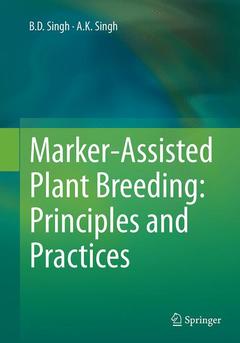Description
Marker-Assisted Plant Breeding: Principles and Practices, Softcover reprint of the original 1st ed. 2015
Authors: Singh B.D., Singh A.K.
Language: English
Subjects for Marker-Assisted Plant Breeding: Principles and Practices:
163.51 €
In Print (Delivery period: 15 days).
Add to cartPublication date: 10-2016
Support: Print on demand
Publication date: 07-2015
514 p. · 17.8x25.4 cm · Hardback
Description
/li>Contents
/li>Biography
/li>Comment
/li>
Marker-assisted plant breeding involves the application of molecular marker techniques and statistical and bioinformatics tools to achieve plant breeding objectives in a cost-effective and time-efficient manner. This book is intended for beginners in the field who have little or no prior exposure to molecular markers and their applications, but who do have a basic knowledge of genetics and plant breeding, and some exposure to molecular biology. An attempt has been made to provide sufficient basic information in an easy-to-follow format, and also to discuss current issues and developments so as to offer comprehensive coverage of the subject matter. The book will also be useful for breeders and research workers, as it offers a broad range of up-to-the-year information, including aspects like the development of different molecular markers and their various applications. In the first chapter, the field of marker-assisted plant breeding is introduced and placed in the proper perspective in relation to plant breeding. The next three chapters describe the various molecular marker systems, while mapping populations and mapping procedures including high-throughput genotyping are discussed in the subsequent five chapters. Four chapters are devoted to various applications of markers, e.g. marker-assisted selection, genomic selection, diversity analysis, finger printing and positional cloning. In closing, the last two chapters provide information on relevant bioinformatics tools and the rapidly evolving field of phenomics.
Part 1-General.- 1. Introduction to Marker-Assisted Crop Improvement.- Part 2-Genetic Markers.- 2. Hybridization-Based Markers.- 3. Polymerase Chain Reaction-Based Markers.- 4. Sequence-Based Markers.- Part 3-Linkage Maps.- 5. Mapping Populations.- 6. Linkage Mapping of Molecular Markers and Oligogenes.- 7. Mapping of Quantitative Trait Loci.- 8. Association Mapping.- Part 4-Applications.- 9. Marker-Assisted Selection.- 10. Genomic Selection.- 11. Phylogenetic Relationships and Genetic Diversity.- 12. Finger printing and Gene Cloning.- 13. High-Throughput Genotyping.- 14. Bioinformatics Tools and Databases for Genomics Research.- 15. Phenomics
Brahma Deo Singh
Brahma Deo Singh is currently Emeritus Professor at School of Biotechnology, Banaras Hindu University, Varanasi, India. He obtained his Bachelor’s degree in agriculture from Allahabad Agricultural Institute, Allahabad, India and Master’s degree in Agricultural Botany from Government Agricultural College, Kanpur, India with first position in the university, and was awarded the University Gold Medal. He earned his Ph.D. degree from University of Saskatchewan, Saskatoon, Canada. Prof. Singh has 40 years of teaching and research experience in the areas of genetics and breeding of pulse crops, plant tissue culture, biological nitrogen fixation, and molecular markers. He has published over 150 research papers in reputed journals and authored several books in genetics, plant breeding and biotechnology. He was awarded the First Prize of the Dr. Rajendra Prasad Puraskar in 1987 and 1990 by the Indian Council of Agricultural Research, New Delhi for the books PadapPrajanan and Anuvanshiki, respectively.
Ashok Kumar Singh
Ashok Kumar Singh, Fellow of National Academy of Agricultural Sciences, India, is at present Head, Division of Genetics at the prestigious Indian Agricultural Research Institute, New Delhi. He completed his bachelor’s and Master’s degrees from Banaras Hindu University, Varanasi, India, and obtained his Ph.D. degree from the institute where he is currently working as a dedicated teacher and rice breeder. He has been associated with the development of eleven Basmati rice varieties, including the first superfine grain aromatic rice hybrid Pusa RH 10, which combine earliness with higher yield and higher per day productivity with excellent grain and cooking quality. He has successfully integrated marker-assisted selection for incorporating resistances to bacterial blight, blast, brown plant hopper drought, salinity and submergence in rice varieties. His current research interests include TI
Provides detailed coverage from the basics to the current information on marker-assisted plant breeding
Provides the molecular basics and techniques for novel plant breeding strategies
Addresses plant molecular geneticists as well as plant breeders in the public and private sector




